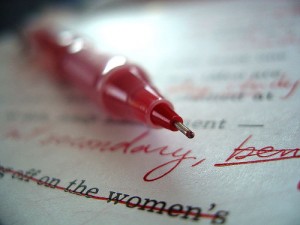 It’s hard enough being an unpublished writer, struggling along with the rest of the teeming multitude, trying to get noticed, so why the heck do we make things harder for ourselves by perpetuating myths, misunderstandings and downright untruths about the process of being published?
It’s hard enough being an unpublished writer, struggling along with the rest of the teeming multitude, trying to get noticed, so why the heck do we make things harder for ourselves by perpetuating myths, misunderstandings and downright untruths about the process of being published?
Hang about in any writer’s community, be it online or in the real world, and sooner or later you will encounter a manifestation of this phenomenon. It happens with the inevitability of Godwin’s Law: just as every Internet argument will devolve into accusations of Nazism, so every place where unpublished writers gather together will throw up one of the following gems.
Editors are eeeevil
No, they’re not. They’re human beings, not the spawn of the pit. They are professional word-wranglers and it is their job to improve your work. They’re like Berocca for your book: it’s you on your best day, only better.
They’ll hack my work to pieces
No, they won’t. Seriously, if it needs that much work, there’s little chance the publisher would have laid out money for it in the first place unless you’re a 21 year old celebrity with a sensational autobiography who can’t write worth a damn.
What an editor does is apply polish. No matter how shiny you think your manuscript is, it’s a fact that we all make mistakes, or aren’t quite as clear as we could be. The editor will smooth out the sentence structure, weed out repetition or overwriting and then wrap it all up in house style. You should barely be able to see where they’ve been, but read the book afterwards and you’ll be amazed at your literary genius all over again.
But I’ve got no say over the changes they make
Wrong again. Your editor will send you a copy of your manuscript with all the changes in it, and you get to approve pretty much every comma, deletion and rewording they’ve done.
The editor will have a damn good reason for every change they make. Maybe what you wrote was ungrammatical, repetitious or inane. Maybe it was a poor analogy, or you’re overusing a word. People do stuff like nod and shrug all the time, for instance, but in books nods and shrugs are, to quote my editor, “heinously overused”.
 So it follows that if you want to alter something the editor has done, you must justify it. If your justification is good, you’ll probably get your way, but you’ll have to give a little to get a little. You can’t just snap and snarl like a terrier with a chew-toy it doesn’t want to give up, clicking “Reject change” on everything, and expect to be taken seriously. That is the mark of an amateur, or the kind of pain-in-the-ass author that nobody wants to work with. Get over yourself and start acting like a professional.
So it follows that if you want to alter something the editor has done, you must justify it. If your justification is good, you’ll probably get your way, but you’ll have to give a little to get a little. You can’t just snap and snarl like a terrier with a chew-toy it doesn’t want to give up, clicking “Reject change” on everything, and expect to be taken seriously. That is the mark of an amateur, or the kind of pain-in-the-ass author that nobody wants to work with. Get over yourself and start acting like a professional.
Belief in your ability to write is essential in this business, but you also need a healthy dose of humility. Nobody’s prose is so golden that it is beyond improvement. Nobody’s – not even God’s (read the Bible and you’ll see what I mean; if He’d had a decent copy-editor there wouldn’t be all those long lists of begats in the Old Testament).
But seriously, when the edit is complete, and you read your book through with “Track changes” set to “Final” so you can’t actually see what the editor’s done, you probably won’t want to change very much at all.







I’m depserate for an editor to work alongside me with my ms before it goes to print. I think editors are the best thing since sliced bread… that’s the one benefit that mainstream published authors have over independent authors… they get to live, breathe and eat with their editors!
I’ve a few friends who are editors, as well as working on their own writing. It takes a special talent to be able to edit – I can’t do it… that’s one reason I set up “Welcome to Wherever”, to get the practise at reading other people’s work and spotting the mistakes in it.
Nice Post!
M?
Nice to see the other half of the argument. I admit to some curiosity over what the changes were. (Nod and shrug – yes indeed, along with frowned, stared and no doubt some others)
I’m in agreement with you. Seems stupid to think that an editor would want to destroy your work and then publish it. I think it’s important to remember that the editor has a reputation to maintain. It would be professional suicide to slaughter manuscripts and then publishing them so the world could see what a crappy job you did on your end. Now, if it’s an independent service, that might be reason to proceed very carefully. But the editors I’ve worked with have been polite and I’ve benefited from their suggestions.
Laurel Wilczek
Hi, Ellie
This is a beautiful post, encouraging , true to nature and I couldn’t agree more.
Since I’m working as a freelance editor, I get to see the manuscripts that aren’t ready yet, so I whip them into shape where possible. Once you’re over that stage, the changes of an editor of a publishing house are only minor.
And authors should be grateful instead of complaining. Once taken on by a house, they have an editor helping them for free, plus, they will be published.
Good article.
All the best to you and we’ll see you on AOS again.
Nicole
Ahhhh! I enjoyed reading that. A breath of fresh air 🙂
Brilliant post, Ellie.